We believe AI isn’t here to take our jobs—it’s here to make life easier and way more fun! But are you really using AI to its full potential? Sure, it can boost productivity, but what about using it for pure convenience… or even a little adventure?
If you’re THAT friend or family member who always plans the itineraries, keeps track of passports, and books tickets, or simply someone whose mantra is: “Live. Laugh. Love. Travel.” — here’s a cool hack: let AI be your personal travel agent! From crafting the perfect itinerary to finding hidden gems, AI can do the heavy lifting while you sit back and get excited about your trip. Why stress when you can let tech do the work? Give it a shot and let AI take your next vacation to the next level!
To find out which AI is the best travel planner, we tested three AI tools: ChatGPT, Gemini, and Roam Around. Below is a comparison of their capabilities, strengths, and weaknesses.
The Testing Prompt
If you want to try this yourself, here’s a prompt you can use:
“I’m planning a [trip length] trip to [destination] on [specific dates]. I prefer [travel style: budget, luxury, adventure, cultural, foodie, solo, family, etc.] and want to explore [specific interests: historical sites, hidden gems, nightlife, nature, etc.]. My budget is [specific budget or flexible]. I need recommendations for:“
Note: In “Roam Around,” you need to fill out the text boxes with your preferences before generating an itinerary.
ChatGPT as a Travel Planner
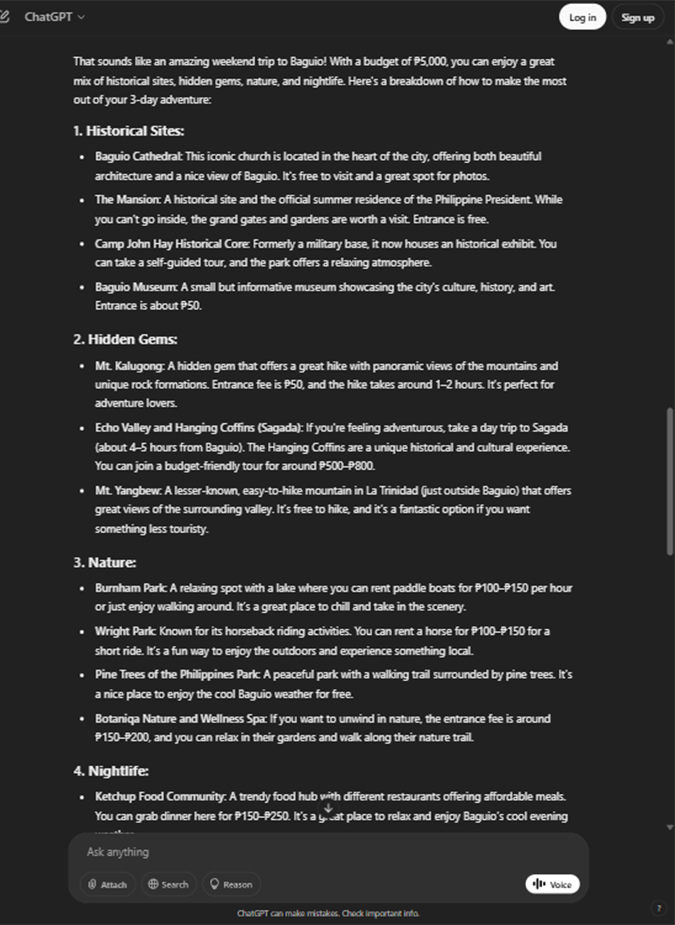
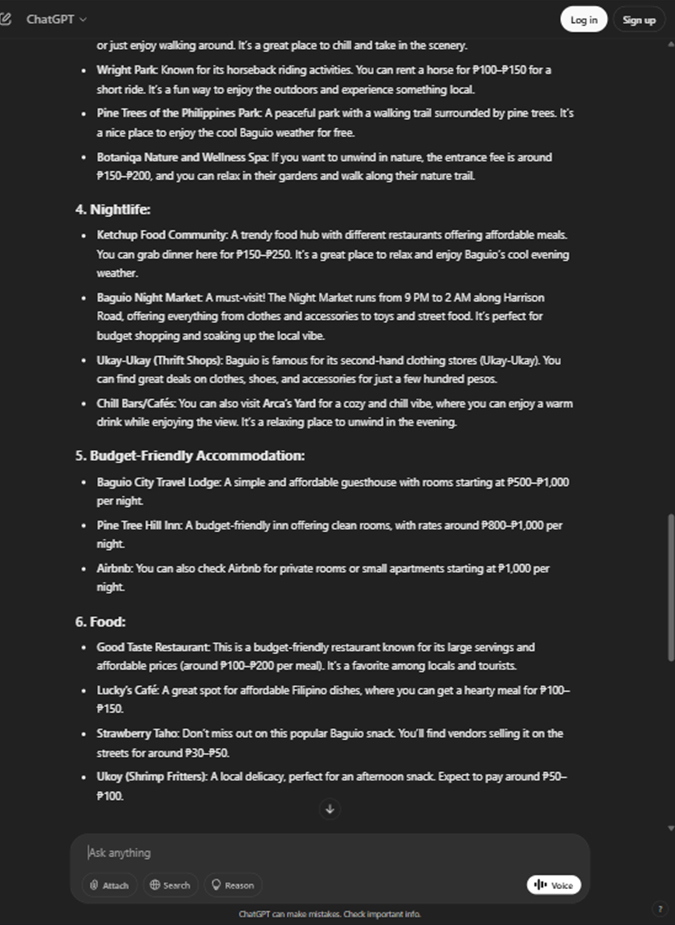
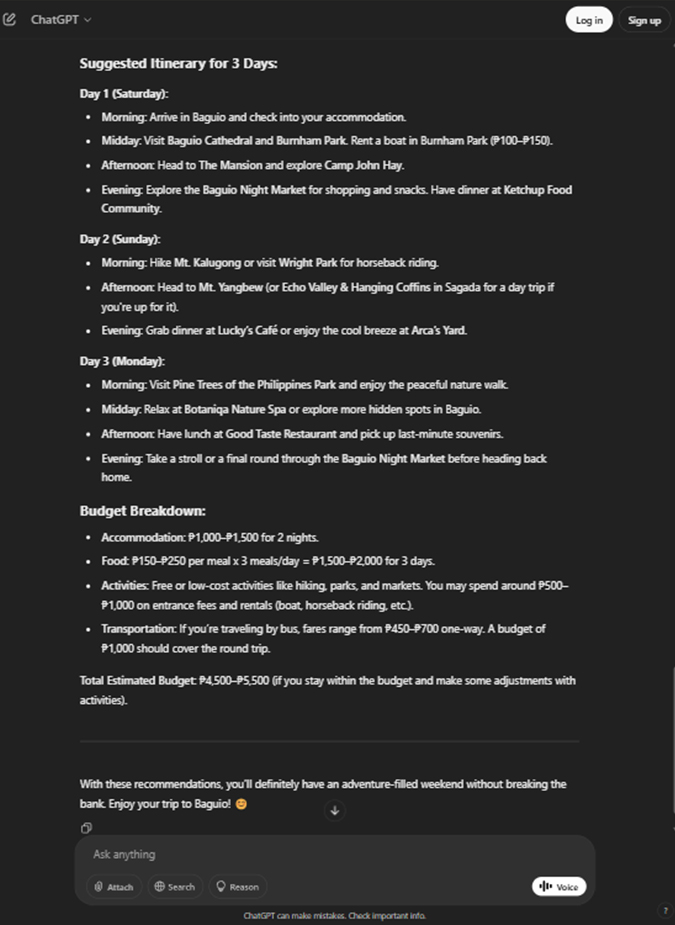
ChatGPT is like that super-organized friend who makes spreadsheets for everything. It dishes out well-structured itineraries with a realistic budget breakdown (still depending on your spending habits), making sure you don’t end up broke halfway through your trip. It even throws in handy transportation tips, whether you’re hopping on a train, catching a cab, or just strolling through scenic streets. Plus, it sprinkles in safety tips and travel hacks to keep you from making rookie mistakes.
But here’s the catch — ChatGPT can be a bit too ambitious. Some of its itineraries feel like a marathon, leaving little room to breathe. It also lacks real-time updates, so if a museum suddenly decides to close for the day, you’re out of luck. And if you’re someone who loves nightlife and spontaneous socializing, you might find ChatGPT’s recommendations a bit too tame.
Gemini as a Travel Planner
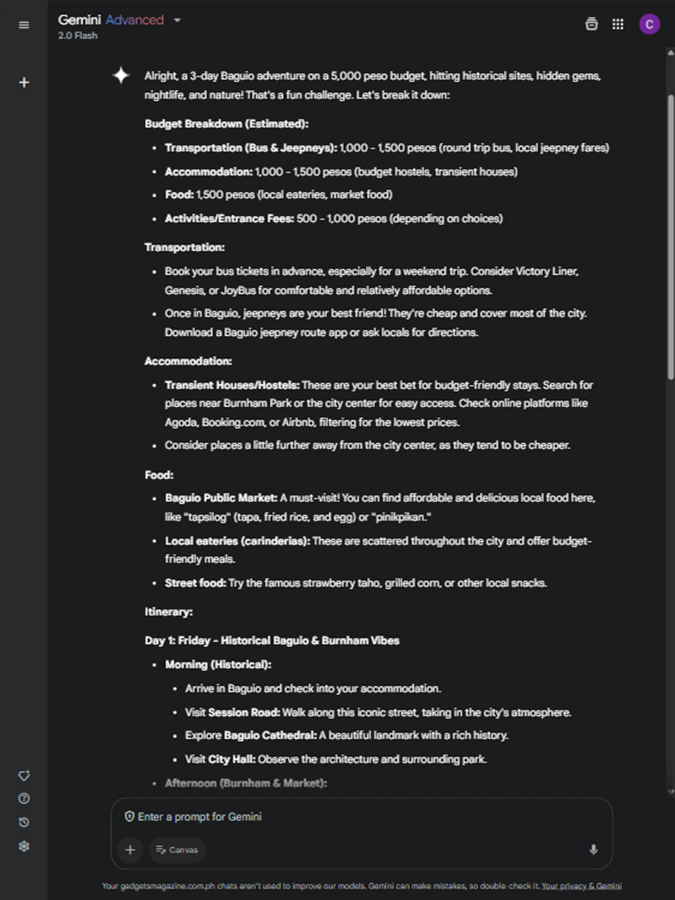
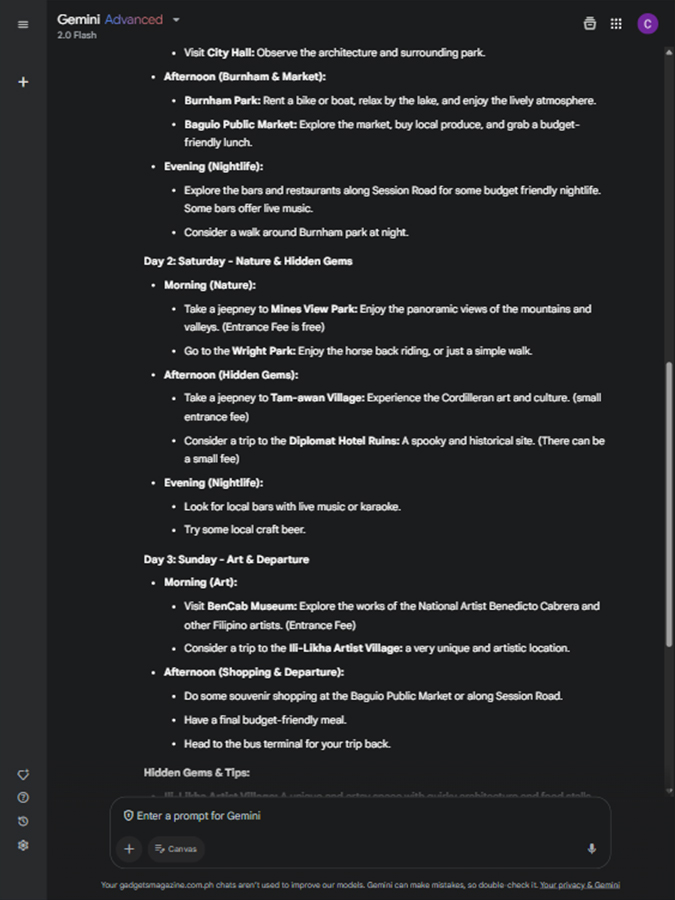
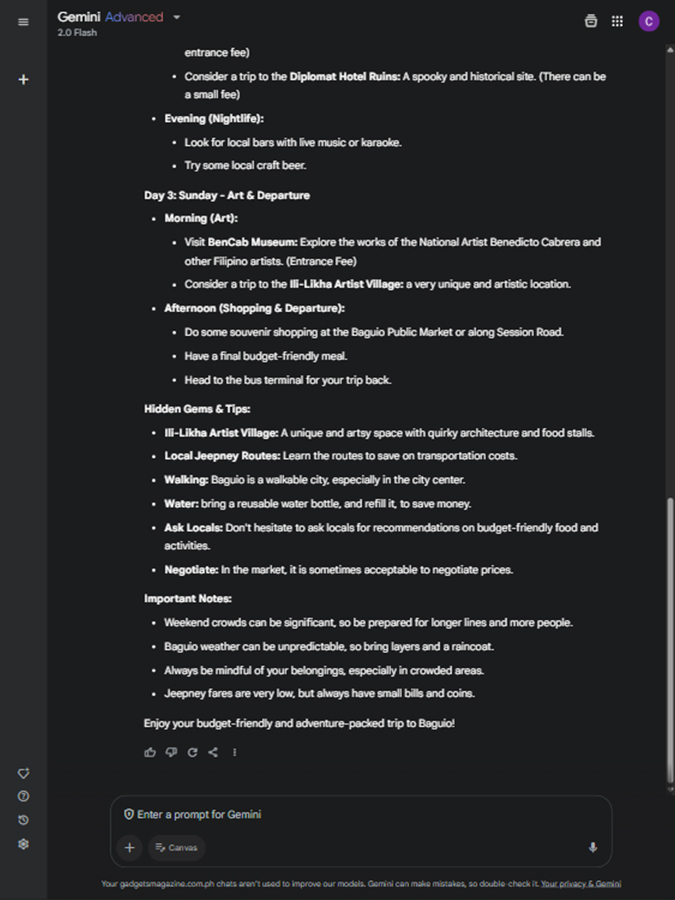
Gemini is your laid-back, budget-conscious travel buddy who knows where to find the best street food. It’s fantastic for solo adventurers, focusing on free activities, local eateries, and scenic experiences like beach sunsets and hidden hiking spots. If you’re a foodie, you’ll love how Gemini hypes up local delicacies — ever heard of Chori Burgers or Jonah’s Fruit Shakes? Now you have! It even tosses in practical travel hacks like how to bargain at markets and avoid common scams.
But don’t lace up your walking shoes just yet — Gemini assumes you have unlimited energy. It often suggests a lot of walking without factoring in transport alternatives, which could be exhausting. It also skips over some must-do activities. For example, if you’re heading to Boracay, you might miss out on snorkeling, cliff diving, or island hopping, which are basically the heart of the experience.
Roam Around as a Travel Planner
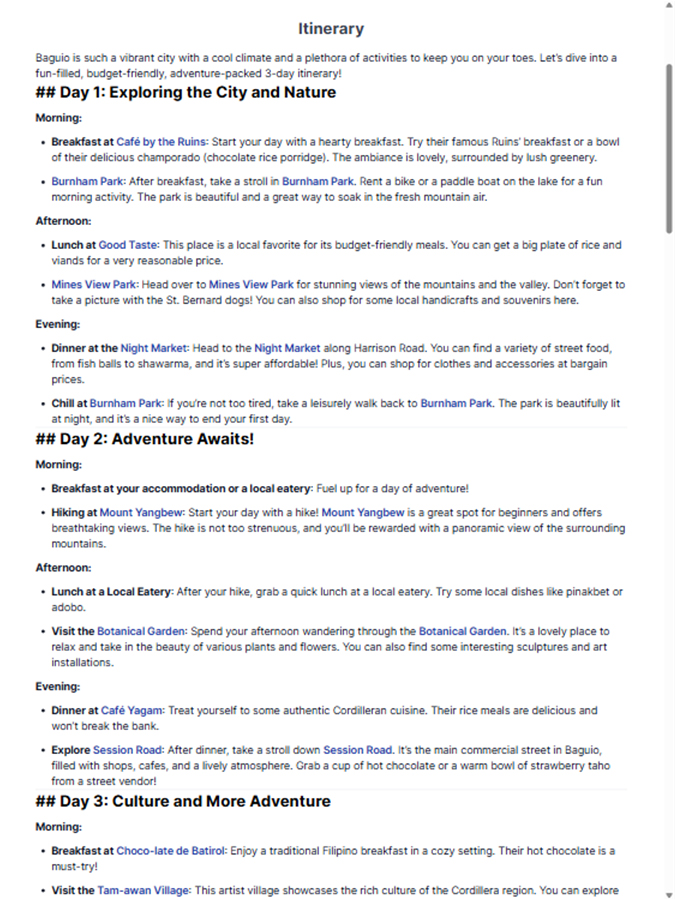
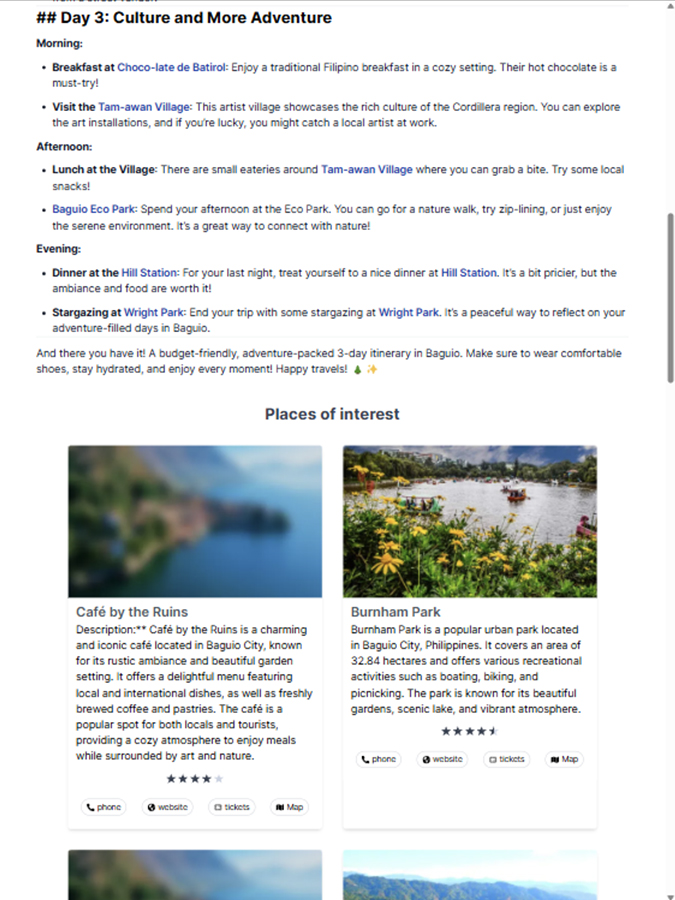
Roam Around is the social butterfly of travel AIs, perfect for those who love meeting new people. It’s all about bars, night markets, and hotspots where you can mingle with locals and fellow travelers. A big plus? It lets you click through to maps, websites, and descriptions of places, making it super user-friendly. It even recommends AI tools like Klook and Google Maps to help smooth out your plans.
But before you pack your bags, know this — Roam Around isn’t the best at keeping your wallet happy when traveling for days and nights. It often overshoots the budget and relies a lot on costly transportation like motorbike rentals and long boat rides. Plus, its itineraries lean heavily on mainstream tourist spots rather than immersive cultural experiences. And if you’re doing island hopping, be ready for a whirlwind — its plans can feel rushed, cramming too many destinations into a short time.
So, which AI is the best?
Overall, after running a little AI travel itinerary showdown, it’s clear that each AI has its own “personality” when it comes to planning trips — even with the same location and budget. While all three offer solid insights, their priorities and styles vary significantly.
ChatGPT is like that meticulous friend who color-codes their planner and always knows the best route to avoid traffic. It crafts a well-balanced itinerary that blends adventure, culture, and food while keeping things structured and budget-friendly. Each day flows smoothly, with detailed transport options, estimated costs, and even safety tips, making it perfect for travelers who want a hassle-free, no-guesswork plan. Bonus points for integrating AI-powered tools like Google Maps and Grab, giving it a modern, tech-savvy edge.
Gemini, on the other hand, is the budget-conscious backpacker who thrives on local finds and street food. It prioritizes affordability, encouraging travelers to hop on public transport, eat at market stalls, and explore the city like a local. While this makes it a dream for solo budget travelers, it sometimes skips major attractions in favor of everyday cultural experiences — so if you want that postcard-perfect tourist shot, you might need to tweak the plan.
Then there’s Roam Around, the adventure-seeker of the bunch. If your idea of a perfect trip includes zip-lining, nature reserves, and scenic treks, this AI has your back. Its itinerary leans toward a more relaxed, experience-driven journey rather than a strict schedule — great for those who like to go with the flow. However, this thrill-seeking lifestyle can mean a slightly higher budget, especially with some splurge-worthy dining choices thrown in.
Using AI for trip planning has some serious perks. It takes the legwork out of research, helping you craft a structured, well-informed itinerary in minutes instead of hours. It suggests must-visit spots, dining recommendations based on your budget, and even estimated costs, so you don’t accidentally blow your travel fund on day one. Navigation is also a breeze with AI-powered apps like Google Maps, Sakay.ph, and Grab, making sure you reach your destinations with minimal drama. First-time travelers, take note: AI makes it easier to explore confidently without feeling overwhelmed.
But let’s not put AI on a pedestal just yet. It’s great, but it’s not perfect. AI itineraries rely on data that may not always be up to date, so you might run into outdated recommendations or miss out on real-time factors like sudden weather shifts, peak tourist hours, or unexpected business closures. And let’s be real — AI doesn’t have that personal touch. It might point you toward trending spots, but it won’t always capture the magic of hidden gems, local quirks, or spontaneous moments that make travel truly special.
That’s why AI should be your travel assistant, not your travel overlord. Use it to gather insights, structure your trip, and streamline logistics — but always leave room for flexibility. Maybe AI didn’t mention that charming street vendor selling the best local delicacy, or perhaps there’s a pop-up festival happening that day. Embracing the unexpected is half the fun! Over time, AI-assisted planning may even sharpen your travel instincts — so go ahead, let AI do the heavy lifting, but keep your sense of adventure intact.
Words by Aljhelyn Piador
Also published in GADGETS MAGAZINE Volume 25 No. 8 Issue
